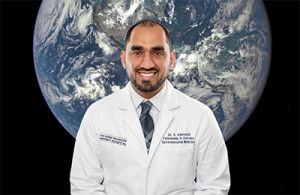There are a few locations along the Potomac River that Abdulla Alhmoudi, MD, RESD ’18, would recommend if you enjoy rock climbing. But, he cautions, they’re all single pitch — a climb lasting one rope length. If you want multi-pitch climbs, the closest spot is in Seneca Rocks in West Virginia. “It’s a bit of a drive,” he says. “But it’s beautiful.” For most people, extreme rock climbing would be hobby enough. Alhmoudi, however, has higher ambitions. He enjoys extreme environments as well, ones that test the human body, such as high altitude and outer space.

Alhmoudi, a fellow in the Extreme Environmental Medicine Program in the George Washington University (GW) School of Medicine and Health Sciences Department of Emergency Medicine, is originally from the United Arab Emirates (UAE) and currently serves as a member of the UAE Armed Forces. He traveled through England and Scotland before attending medical school at the Royal College of Surgeons in Ireland, located in Dublin. Alhmoudi was not sure what he wanted to specialize in as he entered his medical education.
“I was interested in first aid and providing care from the first point where the emergency happens,” he recalls. “Emergency medicine offers the opportunity to treat any injury or acute condition, any gender, any age group, and have the confidence to stabilize and treat [patients].”
While Alhmoudi completed his emergency medicine residency at GW, the UAE established a program to train and send Emirati astronauts to the International Space Station to run experiments and conduct research. Inspired by mentor Kris Lehnhardt, MD, a former emergency medicine physician at GW, who also had an interest in space and its long-term impacts on human health, Alhmoudi applied for and went through the UAE Space Agency astronaut selection process.
When astronauts are sent to the International Space Station, their main duties include performing maintenance of the station and conducting research and experiments. The preparation involves two years of basic astronaut training, though depending on the mission and the research they will be involved in, they may have more specialized training. Possible areas of research on the International Space Station include astronomy and biology. Alhmoudi is interested in conducting experiments related to human physiology in space.
“The initial plan was to train four astronauts to go to the International Space Station,” he explains. “But then it was decided that two would go. I was ranked third in the process.” But Alhmoudi isn’t discouraged. In fact, he plans on taking another shot when the next selection process starts. When he finishes his fellowship at GW, Alhmoudi will return to the UAE, where he will work with residents in the emergency department of a military hospital. While Alhmoudi’s path forward has a clear trajectory on the ground, he hopes the journey that took him from the UAE to England, Scotland, Ireland, and the U.S. also takes him into space.



